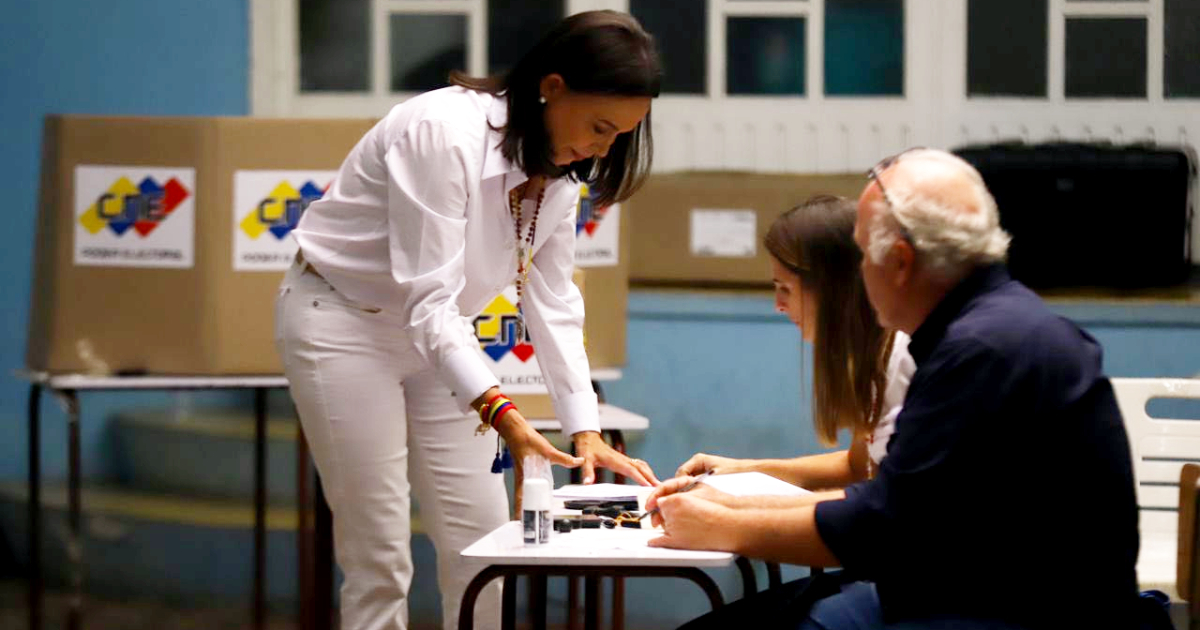The political climate in Venezuela has become increasingly tense following the recent proclamation of Nicolás Maduro as the winner of the presidential elections by the Chavista electoral authority, a decision vehemently rejected by the opposition.
On Monday, July 29, 2024, Venezuela's Chavista electoral authority announced Maduro's re-election, a result that immediately triggered a wave of protests and rejection from the opposition and a significant portion of the population.
The electoral controversy has created an atmosphere of uncertainty and potential confrontations in the South American country. According to the regime's electoral authority, Maduro allegedly won by a significant margin, ensuring his continued hold on power. The National Electoral Council (CNE) awarded the Chavista leader 51.2% of the votes compared to 44.2% for Edmundo González.
However, the opposition, led by prominent figures such as María Corina Machado, has declared these results fraudulent and unrepresentative of the Venezuelan people's will. Machado, one of the most vocal leaders of the opposition, flatly refused to acknowledge Maduro's victory. In a strong statement, Machado asserted that "Venezuela has a new elected president, and it is Edmundo González," referring to the opposition candidate she claims was the true winner of the elections.
Allegations of Irregularities
The opposition has filed numerous allegations of irregularities during the electoral process. Among the most severe accusations are vote manipulation, voter intimidation, and control of polling stations by forces loyal to Maduro's regime.
These claims have been the spearhead of the protests and the opposition's mobilization, which demands a thorough review of the count and the involvement of international observers to ensure the process's transparency.
One of the main allegations focuses on the alteration of results in the most strategic polling centers. The opposition claims that several localities showed a significant discrepancy between the registered votes and the results announced by the electoral authority.
Additionally, there were reports of coercion of electoral officials and manipulation of electronic voting systems, casting doubt on the integrity of the entire process.
International Reactions
The international community has closely followed the developments in Venezuela. Several nations and international organizations have expressed concern over the fraud allegations and called for peaceful dialogue between the parties.
The United States, the European Union, and several Latin American countries have issued statements urging Maduro's government to allow an independent investigation into the alleged irregularities and to respect the Venezuelan people's will.
"We recently saw the announcement from Venezuela's electoral commission. We are seriously concerned that the announced result does not reflect the will or the votes of the Venezuelan people," stated the U.S. Department of State on social media.
Furthermore, it considered it "essential that every vote be counted fairly and transparently, that electoral officials immediately share information with the opposition and independent observers without delay, and that the electoral authorities publish the records."
"The international community is closely monitoring this and will respond accordingly," warned the U.S. government through its embassy in Venezuela.
Also, the President of Chile, the socialist Gabriel Boric Font, expressed skepticism about the official results presented by Maduro's regime.
In a social media post, the Chilean president addressed the "Maduro regime," pointing out that "the results they publish are hard to believe."
"The international community and especially the Venezuelan people, including the millions of Venezuelans in exile, demand total transparency of the records and the process, and that international observers not committed to the government attest to the results' veracity. From Chile, we will not recognize any result that is not verifiable," Boric Font added.
However, not all international actors have taken the same stance. Allies of Maduro's regime, such as Cuba, Russia, and China, have recognized the electoral results and congratulated the president on his re-election.
Implications for Venezuela's Future
The electoral crisis in Venezuela has profound implications for the country's future. The opposition's refusal to accept the results and Maduro's regime's persistence in staying in power predict a period of increased polarization and conflict.
Protests and demonstrations could intensify, potentially leading to government repression and further social tensions.
The economic landscape offers no respite either. The prolonged economic crisis, marked by hyperinflation, unemployment, and shortages of basic goods, could worsen due to political instability.
Venezuelans face an uncertain future, where the search for peaceful and democratic solutions will be crucial to avoiding further erosion of the country's institutions and social fabric.
In conclusion, Maduro's proclamation as president of Venezuela amid allegations of electoral fraud has deepened the country's political and social crisis. The opposition, led by figures like María Corina Machado, rejects these results and demands a review of the electoral process. The international community remains divided in its reactions, while Venezuelans face a future filled with uncertainty and challenges.
Political Crisis in Venezuela: Key Questions and Answers
Given the controversial re-election of Nicolás Maduro and the ensuing political turmoil in Venezuela, here are some key questions and answers to help understand the situation better.
What irregularities has the opposition reported during the election?
The opposition has reported numerous irregularities, including vote manipulation, voter intimidation, and control of polling stations by forces loyal to Maduro's regime. They also allege coercion of electoral officials and manipulation of electronic voting systems.
How has the international community reacted to Maduro's re-election?
The international community has shown mixed reactions. Countries like the United States, the European Union, and several Latin American nations have expressed concern and called for an independent investigation. In contrast, allies of Maduro's regime, such as Cuba, Russia, and China, have recognized the results and congratulated Maduro.
What are the potential implications of this crisis for Venezuela's future?
The crisis could lead to increased polarization and conflict, more intense protests, and potential government repression. The economic situation, already dire with hyperinflation and shortages of basic goods, might worsen due to political instability.
